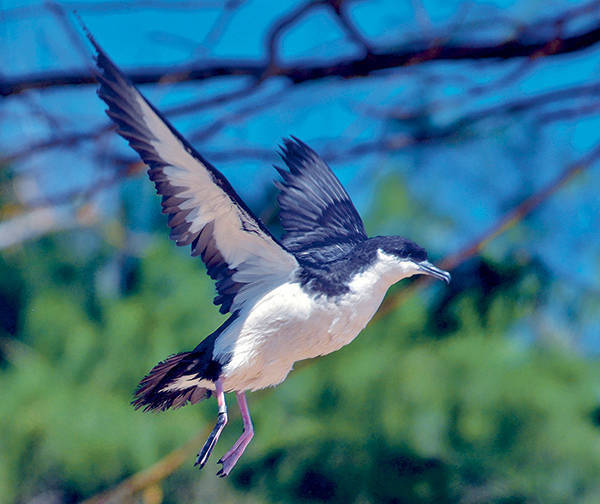LIHUE — The Center For Biological Diversity is again asking privately-owned businesses, hotels, and shopping centers on Kauai to turn out the lights for the birds.
The problem stems from the endangered Hawaiian petrels and threatened Newell’s shearwaters, both of which nest on Kauai.
The birds are attracted to, and disoriented by, bright lights at night, particularly when they’re fledging out to sea. They circle the lights when they’re distracted by them, and eventually fall to the ground where they are vulnerable to predators.
“We are approaching this problem from a more collaborative approach and are not publicly naming the businesses that have the worst lighting,” said Brett Hartl, government affairs director for the Center for Biological Diversity.
Instead, the Center is sending letters to individual business and establishment owners, asking them to change potentially harmful lighting to bird-friendly lights.
“The Center has begun asking private businesses like hotels and shopping centers along the south, east and north shores of Kauai to work with the U.S. Fish and Wildlife Service to modify their lights and reduce harm,” Center representatives said in a press release.
Fledging season for young birds is between September 15 and December 15, and the birds rely on the moon to guide them to sea when they fledge.
Fallout occurs when the seabirds fixate on the wrong light and circle buildings and manmade lights instead of following the moon.
It’s not a new problem.
The Pacific Missile Range Facility has the Dark Skies program devoted to minimizing impact of lights on the base at Major’s Bay.
In 2011, the Kauai Island Utility Cooperative, St. Regis Princeville Resort and County of Kauai were ordered to create and carry out actions described in a habitat conservation plan.
The utility created its own plan for the shearwaters, while the other two entities formed an islandwide plan and included the state transportation department in the partnership.
While steps have been taken to protect the birds, those at the Center for Biological Diversity say more can be done.
On an individual level, people living on Kauai can replace fixtures that scatter lights in many directions, like globe and carriage lights. Replace them with fixtures that point down and away from the beach.
Drawing drapes over large windows and replacing white incandescent and florescent lighting with a maximum 40-watt yellow bug light are other ways to help.
Residents can keep an eye out for downed birds and keep pets supervised and controlled so they don’t attack any downed birds they might come across.
“It’s not too late to save Kauai’s endangered seabirds from extinction, but everyone needs to do their part,” Hartl said.
He continued, “Leaving a few bright lights on may not seem like a problem, but when you combine them all, Kauai becomes a very bright and deadly spot for these seabirds.”
Letters were sent out to those Kauai business owners on Wednesday, according to the Center, and are not initiating legal actions.
“Instead (they) are designed to encourage private businesses to take proactive steps to conserve Kauai’s seabirds,” the Center’s release said.
•••
Jessica Else, environment reporter, can be reached at 245-0452 or at jelse@thegardenisland.com.



Adequate lighting is paramount for the safety and security for all. When the first patron or worker sues your business for millions after they get hurt on your property cause they can’t see at night, you’ll be like the majority of the common sense people and say “buck the firds”
haynkane, “I second that!”